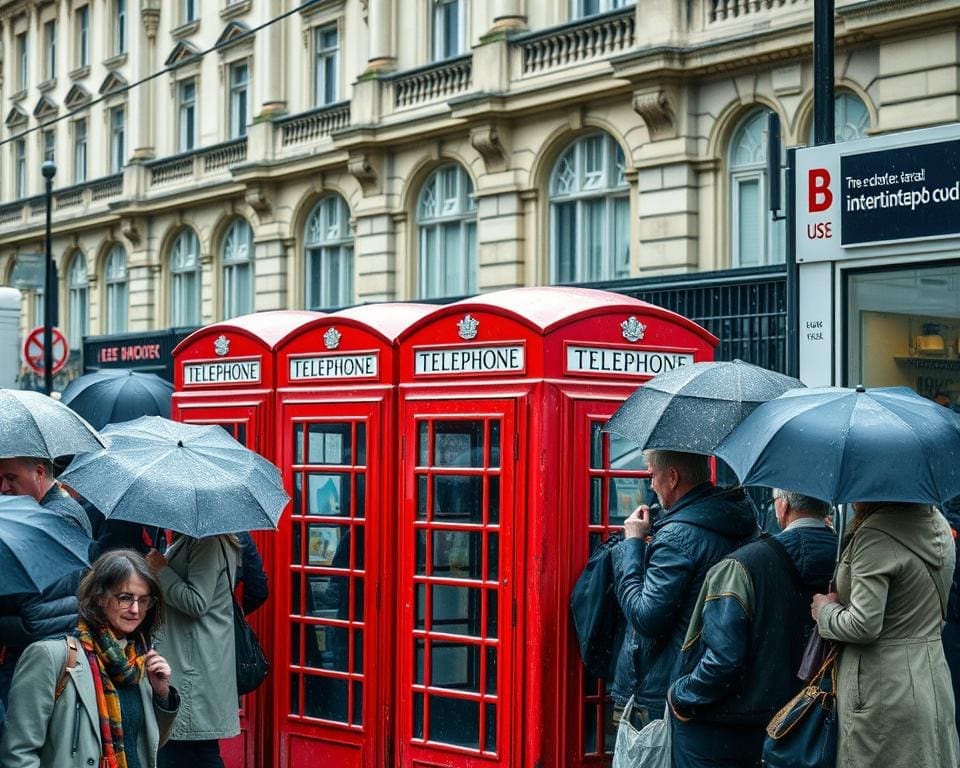The British queue, an enduring symbol of national pride, encapsulates the essence of patience in British culture. It serves not merely as a way to organise waiting but as a profound lesson in patience itself. This article delves into the significance of this societal norm, reflecting on how queuing has evolved over time, showcasing the British people’s inherent values of respect and consideration for others. As we explore the cultural dimensions of the British queue, we uncover its role not just in daily life, but as a reflection of the virtues that bind the nation.
The Cultural Significance of the British Queue
The British queue stands as a fascinating cultural phenomenon, reflecting both historical origins and contemporary social interactions. This practice, rooted in the fabric of British society, not only exemplifies patience but also showcases the values held by communities across the nation.
Historical Origins and Developments
The inception of British queuing can be traced back to the late 19th century, a period marked by rapid urbanisation and industrialisation. As public services became increasingly strained, the need for a structured approach to waiting emerged. What began as a simple method to manage chaos evolved into a significant cultural practice that found its place in the daily lives of citizens. The origins of this system reflect how society adapted to changing demands, gradually embedding queuing into the essence of British life.
Influence on Social Interactions
Queuing has a profound impact on social interactions within the UK, transforming what might be a mundane activity into a collective experience. Standing in line, whether at a bus stop or a popular event, fosters a sense of camaraderie among individuals. It serves as an opportunity for casual conversation, shared experiences, and the development of community bonds. The cultural significance of British queuing lies in its ability to connect people, reinforcing social ties in an increasingly fast-paced world.

Is the British queue a lesson in patience?
In a fast-paced world, the act of standing in queues often seems like a lost art. Yet, the British queue serves as a significant reminder of the virtue of waiting. This patience lesson highlights not only our capacity to remain composed in moments of delay but also strengthens our understanding of community and consideration for others.
Understanding the Virtue of Waiting
British queuing exemplifies the importance of patience and self-discipline. When individuals queue, they engage in a collective exercise of respect and fairness. This simple act allows a person to reflect on their emotions and fosters essential life skills, such as empathy and tolerance.
Queues are not merely lines of people; they are opportunities to learn about oneself and others. As individuals await their turn, they practice emotional resilience, adapt their expectations, and develop a deeper appreciation for the needs of fellow queue-goers. The value of this waiting extends beyond the immediate situation, shaping attitudes towards fairness and equality.
Ultimately, the British queue stands as more than a logistical necessity. It has evolved into a profound cultural phenomenon, teaching the enduring patience lesson that echoes throughout daily life, reinforcing the principles of order, respect, and communal harmony.
Patience as a Reflection of British Values
Patience serves as a cornerstone of British values, seamlessly woven into the fabric of social interactions. It embodies civility and respect, crucial for fostering harmony within diverse communities. As individuals navigate daily life, such virtues become apparent in the simple act of queuing, reflecting a universal understanding of fairness and order.
The Importance of Civility
Civility manifests itself through the way people engage with one another. In Britain, adhering to the principles of politeness defines everyday encounters. The act of waiting patiently illustrates this trait profoundly. It encourages respect for others, highlighting a collective commitment to maintaining social decorum. Observing how queues form in public spaces showcases this dedication, reinforcing how patience operates as a reflection of British values.
How Patience Shapes Identity
Patience shapes identity, influencing how individuals perceive themselves and are perceived by others. It fosters a spirit of neighbourliness, facilitating connections among people from various backgrounds. Such interactions often lead to a greater appreciation for cultural differences, enriching the community experience. In this light, patience is not merely a trait; it evolves into a defining characteristic of British identity, highlighting the importance of understanding and empathy in everyday life.
The Art of Queuing: Rules and Etiquette
The art of queuing is a quintessential aspect of British life, steeped in unwritten rules and etiquette that govern behaviour while waiting in line. Understanding these guidelines is crucial for anyone wanting to blend seamlessly into British queues. Respecting personal space is one of the fundamental rules; maintaining a respectful distance creates a more pleasant environment for all, reducing the tension that might arise in close quarters.
Cutting in line is viewed with disdain, considered a breach of queue etiquette that can invoke strong reactions. This principle not only preserves order but also reinforces mutual respect among individuals. A simple nod or smile to acknowledge fellow queuers fosters a sense of camaraderie, allowing for a more harmonious waiting experience.
Specific settings like grocery stores or public events epitomise these rules. In bustling supermarkets, patience is key as shoppers navigate their way through aisles. The emphasis on orderly behaviour reflects the broader values of organisation and respect inherent in British society. Whether one is standing in line for a much-anticipated concert or waiting for public transport, the essence of queuing remains rooted in these time-honoured practices.
Psychological Aspects of Waiting in Line
Exploring the psychological aspects of waiting in line offers valuable insights into the emotional responses people experience during delays. Queuing can stir a variety of feelings, from frustration to boredom, each influencing an individual’s overall mental wellbeing.
Emotional Responses to Delays
Delays while waiting in line often elicit a spectrum of emotional responses. Individuals may encounter feelings of impatience, which can manifest as irritation or disappointment. These emotions are not merely reactions to the wait but reflect deeper psychological states that can affect mental health. Anticipation can build, creating a sense of hope for the forthcoming experience. Recognising these emotional responses may enhance awareness of personal triggers and promote coping strategies for handling such scenarios.
Impact on Mental Wellbeing
The impact of waiting on mental wellbeing is significant. Longer queues can incite anxiety, contributing to a general sense of dissatisfaction that may linger beyond the experience. Alternatively, this waiting time can serve as an opportunity for reflection or even social interaction, transforming potential frustration into moments of connection. Understanding these dynamics is crucial for fostering resilience and maintaining positive mental health in daily life.
British Queuing in Comparison to Other Cultures
The phenomenon of British queuing stands as a testament to cultural discipline and respect for social norms. In contrast, various queuing cultures around the world exhibit unique behaviours shaped by local customs and values. This comparison reveals a rich tapestry of how societies approach the art of waiting, with some prioritising urgency over the orderly fashion prevalent in British scenarios.
Global perspectives provide insight into these differences. For instance, in some Asian cultures, the emphasis on swift movement can lead to more chaotic forms of queuing. This contrast highlights how deeply rooted cultural dimensions influence queuing practices. Observing these behaviours illuminates the diverse interpretations of patience and civil interaction.
Through international studies, one can discern both unique traits and commonalities in queuing behaviours. Many cultures, while differing in approach, share an understanding of the need to wait at times. These practices not only display a respect for order but also serve to unify individuals, fostering a sense of community among strangers.
The Role of Queuing in Everyday Life
Queuing in everyday life represents a fundamental aspect of British culture, prevalent in various scenarios such as public transport, events, and attractions. The act of waiting patiently embodies a societal norm that fosters respect and order, enriching interactions among individuals. Whether it’s standing in line for a bus or waiting to enter a much-anticipated exhibition, the collective experience of queuing cultivates a sense of community.
Public Transport Experiences
Using public transport often involves navigating queues at bus stops and train stations. Delays may happen, yet passengers generally remain courteous as they form lines. This patience highlights an understanding of shared commitment to maintaining order. Even during peak hours, the unspoken agreement to queue allows for a smoother flow of passengers, reducing chaos and enhancing everyone’s travel experience.
Queuing at Events and Attractions
Major events and popular attractions rely on effective queuing systems to manage large crowds. The anticipation of entering a concert or visiting a museum often includes waiting in line, which can be a rewarding experience if approached positively. Clear organisation ensures that attendees can enjoy the festivities without unnecessary stress. The act of queuing becomes a part of the overall enjoyment, reinforcing the idea that patience is a virtue celebrated within British culture.
Future of the British Queue in a Digital Age
The landscape of the British queue is evolving, significantly influenced by the advances in technology. As we navigate the digital age, the traditional forms of waiting are being redefined, with innovations like mobile ticketing and virtual queues emerging as new norms. This transformation has the potential to revolutionise the future of queuing, allowing individuals to engage with services more dynamically while still reflecting the quintessential values of patience and respect that define British culture.
The technology impact on queuing practices can enhance the queuing experience, reducing the physical time spent waiting while preserving a sense of order. By adopting these advancements, organisations are not only streamlining their processes but also creating an environment where the essence of waiting is reassessed. This balance between efficiency and traditional values raises intriguing questions about the future of patience. Can we embrace speed without losing sight of the virtues that have long governed the British queue?
As we look ahead, the British queue must adapt to these digital innovations without sacrificing its cultural significance. In an increasingly fast-paced world, it will be interesting to observe how the legacy of the queue can coexist with modern conveniences. The path forward may hold promises of increased accessibility and efficiency, yet it is crucial that the spirit of queuing – marked by civility and mutual respect – is nurtured alongside technological advances. Only then can we ensure that the future of the British queue continues to be both relevant and respectful.









